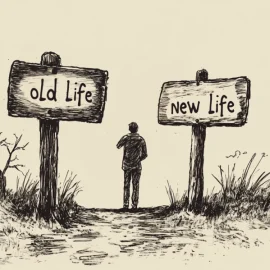

This article is an excerpt from the Shortform summary of "Influence" by Robert B. Cialdini. Shortform has the world's best summaries of books you should be reading.
Like this article? Sign up for a free trial here .
Have you heard terrible stories about pledging fraternities? Why do people keep joining and stay loyal if it’s so awful? How does the psychology of hazing create escalating commitment?
Escalating commitment is a manipulation tactic that leverages one small commitment to create bigger and bigger commitments. Your desire for consistency creates a commitment bias.
Learn how the escalation of commitment bias creates loyalty even after difficult experiences.
What Is the Commitment Bias?
The Consistency Principle says that humans have an obsession with sticking to their guns. Once we’ve committed to something, we pressure ourselves to conform to that commitment. In fact, we’ll convince ourselves that our current behavior and beliefs align with our past behavior and beliefs, even when they clearly don’t.
This creates a commitment bias. Even if your decision or action is wrong or bad for you, you will convince yourself otherwise. Escalating commitment is also seen where you go further down the bad path.
Consistency is generally useful for day-to-day human experience and it’s usually a good attribute for someone to have. It frees us from potential mental overload by giving us an easy, one-size-fits-all guide for how to react to a multitude of situations and people that we encounter each day.
Escalating Commitment
Unfortunately, consistency and commitment can also be exploited. Our desire for internal consistency can turn even a small commitment into larger and larger ones, leading to escalating commitment. In one California study, homeowners were shown to be far more willing to have an unsightly billboard installed on their property after they had agreed to have a much smaller one erected a few weeks earlier. Thus, compliance practitioners who are “only” asking you to sign a petition or answer a few seemingly innocuous questions are usually trying to build you up to agree to ever-larger requests.
By getting you to make one small commitment, savvy compliance practitioners know how to rope you along and lock you into progressively larger commitments. This is the time-honored “foot-in-the-door” sales tactic and creates an escalation of commitment bias. Below, we’ll explore some examples that show just how effective this technique can be.
The Psychology of Hazing: Building Social Cohesion
We’ve seen that putting a commitment down in writing is extremely effective in activating the Consistency Principle to guide future behavior. This is because writing something down requires effort: and the more effort that goes into making a commitment, the more likely it is to influence our beliefs and behavior.
We see escalating commitment most clearly in the elaborate hazing rituals practiced by American college fraternities and sororities. Pledges are subjected to harrowing ordeals where they are beaten, exposed to extreme weather conditions, forced to drink to excess, deprived of food and water, and other elaborate forms of painful initiation. Hazing like this has resulted in severe injuries, psychological trauma, and even death for many college students.
Why do these organizations continue subjecting their members to what can only be described as ritualized torture? It’s not that frat boys are uniquely sociopathic or deviant (as their detractors would like to believe).
The psychology of hazing is really all about group cohesion: the pledges will value their membership in the fraternity more if they’ve gone through excruciating lengths to earn it. Researchers believe that the roots of this lie in cognitive dissonance—the mental burden of carrying two contradictory beliefs at once. The worse the hazing is, the more your mind needs to convince you that joining the group will be a positive, fulfilling experience. Thus, hazing binds new recruits closer to the group through escalating commitments: you invest more into the group, because it’s impossible to stomach the idea that you went through all this hazing for something you don’t actually want. The escalation of commitment bias works in favor of group loyalty.
The fraternities strongly resist any attempts to substitute their hazing rituals for some other, more socially acceptable activity, like community service work. Like the Chinese Communists, the fraternities don’t want to give their pledges a mental “out.” They don’t want new members to be able to tell themselves that they’re going through the ordeal for any reason other than their loyalty and commitment to the group. That’s what the psychology of hazing is built on. Fraternities want the pledges to own the commitment intrinsically.
Charitable work (even if it was genuinely unpleasant) would provide such a mental escape route: it would dilute the pledges’ escalating commitment to the group. Thus, the fraternities have a strong incentive to keep up practices like “Hell Week”: it fosters the behavior and beliefs in new pledges that make the group stronger. In fact, it’s the key to their survival.
The escalation of commitment bias applies to any group that requires a tough initiation to get in—the military, a career, a workplace, even a casual social group.

———End of Preview———
Like what you just read? Read the rest of the world's best summary of Robert B. Cialdini's "Influence" at Shortform .
Here's what you'll find in our full Influence summary :
- How professional manipulators use your psychology against you
- The six key biases you need to be aware of
- How learning your own biases will help you beat the con men around you






